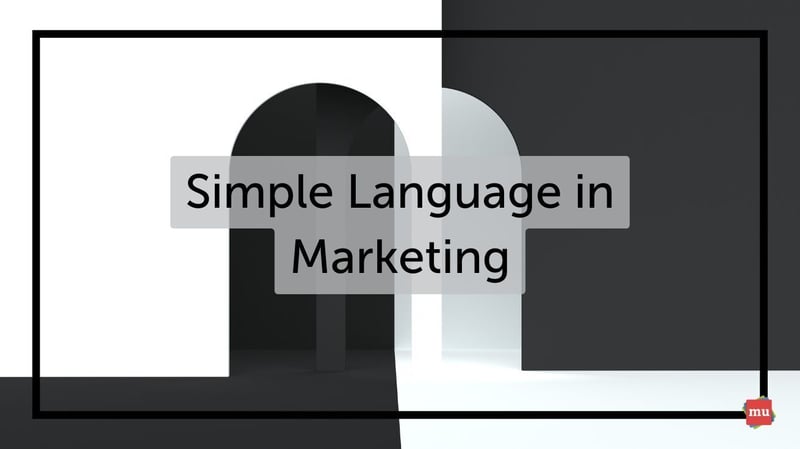The Importance Of Simple Language In Marketing
Written by: Media Update Editor Save to Instapaper
Corporate communication, specifically marketing, is a highly sensitive profession. It is affected by societal trends, language development, economic and political climates, and the list goes on.
Language should therefore be used very intentionally, and the best marketing campaigns communicate simply and briefly.
Word choice in marketing is not just about what sounds good. When writing marketing copy, simple language will always be better than long-winded and overly descriptive or specific language.
So, is there a place for more complicated or scientific language in corporate communication? Yes! Just not when a brand is attempting to draw the attention of consumers with marketing.
Simple language is more effective than complicated writing for various reasons.
Understandability
Marketing is all about communicating value to your consumer base. For consumers to see the value in what you have to offer, they have to understand what is being communicated to them.
Confusing your customer is one of the easiest and fastest ways to ensure that they lose a lot of interest in your product or offering. If potential customers can't immediately understand what it is you want them to buy, your messaging won't stick, and they will move on.
However, if you keep it simple and easy to understand, it's easier for consumers to take action, which makes your audience more likely to do so.
Using understandable language also increases the number of consumers a brand reaches with its marketing because not everyone in its audience will have a deep understanding or knowledge of its industry.
Using simple language is a matter of including a diverse range of people in your messaging, which is especially valuable when marketing to a non-specialist audience and in B2C marketing.
Authenticity
Using plain language is not important because audiences are unintelligent. In fact, they are more intelligent than many brands assume, making it easy for potential consumers to sniff out inauthentic messaging when brands try to sound more complicated than they are.
The thing is, consumers are rarely interested in the intricacies of a brand's process or how complicated product development was. They mostly care about whether or not the brand can provide what they want.
If a brand can communicate to its audience that it has a solution for their problem, there is no need to dress up its messaging with complicated words. This will just harm the brand's authenticity.
Clear, straightforward language comes across as real and trustworthy. Vague, complicated language can easily make it seem like a brand is trying to hide something.
Simple language is also just more relatable than specialist language, and this can help establish trust in your brand.
Message Retention
Simplicity in language also contributes to the clarity of a message. In 2025, people are consuming so much content daily that there is not a lot of bandwidth left for your marketing message.
Therefore, making it as easy as possible to receive your message increases the probability of consumers understanding and remembering it. Familiar, relatable words do not take work to absorb; it just happens.
Audience Engagement
Simpler language can also make your brand more approachable and human. Often, when brands use overly technical words in their marketing, they distance themselves from their audience.
When a brand humanises itself with simple language, it creates the opportunity for an emotional connection with its audience, which is the root of audience brand engagement.
Tips for Simplifying Your Message
- Avoid jargon, acronyms and abbreviations.
- Keep the copy short.
- Use the present tense.
- Write in the active voice.
- Be direct.
We submit and automate press releases distribution for a range of clients. Our platform brings in automation to 5 social media platforms with engaging hashtags. Our new platform The Pulse, allows premium PR Agencies to have access to our newsletter subscribers.
Latest from
- Marine Protected Areas Introduce Interactive Maps to Support Public Awareness and Compliance
- Stained Glass TV Showcases Rising Talent With Inkaba and Isiziba Awards at Durban FilmMart 2025
- Oak Ventures Champions Creativity and Ideal Team Values to Build High-Performing SMEs in SA
- University of Pretoria Becomes First UN Hub in Global South for Sustainability and Development
- Carling Black Label Continues Proud Legacy With SA Rugby in Currie Cup 2025 Campaign
- CFERI Opens Call for Service Providers to Empower Entrepreneurs With Skills and Business Support
- Transgender Prisoner Takes SA Authorities to Court Over Access to Gender-Affirming Healthcare
- SAA Announces New Direct Route From Cape Town to Mauritius With Launch Set for December 2025
- Samsung Opens 2025 EEIP Applications to Support Black-Owned ICT SMMEs and Vision 2030 Goals
- Sanlam ESD Accelerator Programme Drives Fintech Growth With Market Access and Scaling Support
- Shoprite Group Marks Mandela Month With Bold Commitments to Social Impact and Sustainability
- PR Experts Turn to Podcast Guesting as Key Strategy for Authentic Engagement and Brand Trust
- Nedbank Launches Edgy Travel Insurance Campaign With Criminals Warning Tourists to Stay Covered
- African Schools Shine in 2025 World’s Best School Prizes With Recognition for Social Innovation
- SME Supply Chain Inclusion Key to Building a More Equitable and Resilient South African Economy
The Pulse Latest Articles
- Liezel Van Der Westhuizen On Why Winter Workouts Feel Harder And How To Stay Consistent (July 28, 2025)
- From Eastern Cape To England: Zintle Mpupha’s Road To The Rugby World Cup (July 27, 2025)
- Athini Magodla Reveals Why Modern Refreshment Fuels Performance Over Perfection In Today’s Wellness Culture. (July 27, 2025)
- Why More Mums Are Choosing Less Sugar - Not No Sugar (July 27, 2025)
- Scaling Hospitality: How Jimmy Eracleous Runs Two Of Moo Moo’s Top-performing Franchise Restaurants (July 27, 2025)
